Asian elephant protection – China
Conserving Asian elephant populations through coexistence initiativesHow protecting incomes in China helps protect Asian elephants
How protecting incomes in China helps protect Asian elephants
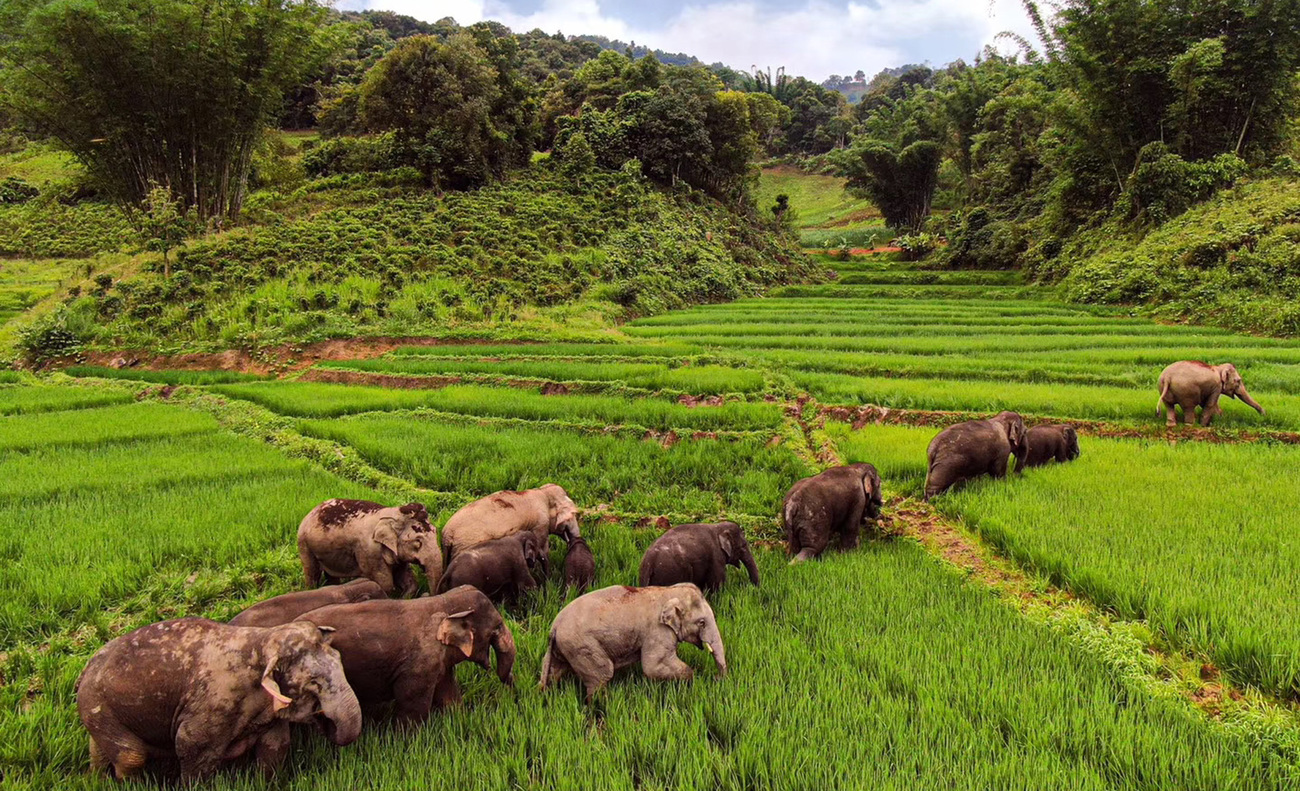
On the edge of Xishuangbanna National Nature Reserve in southwest China, people and endangered Asian elephants live alongside each other.
But coexistence with nature is not always easy, so IFAW has been working here since 2000 to help both elephant and human communities safely thrive together.
One man, Dafan Cao, has worked on the project since the beginning, witnessing how the villagers have become the most dedicated frontline protectors of their elephant neighbours.
It was not always such a harmonious relationship.
The first encounters
In 1992, a wild elephant made its way into the Simao district of Pu'er City, around 50 kilometres north of the reserve. A few years later, a herd of five elephants arrived and settled in the region, making it their home.
Initially, the elephants brought excitement. People flocked to see these magnificent creatures, feeding them as if attending a festival. Everyone considered it a stroke of luck to encounter them.
However, as time passed, people realised the elephants also created challenges. They entered residential areas and ate corn, rice, and sugarcane crops. They damaged farmland, orchards, and houses, causing economic losses and even injuring people.
As the number of elephants increased in China, so did their impact.
Searching for solutions
When Cao and his colleagues first arrived in this village, they realised that the elephants’ once-vast living space was shrinking, compelling them to venture into human areas in search of sustenance.
Cao and his team explained animal-protection laws to people, but those laws failed to adequately address the economic losses caused by elephants feasting on crops. Yunnan was one of the earliest places to establish a government-backed compensation system for damage caused by wild animals, but individual compensation never seemed to be enough.
The team realised that helping people improve their livelihoods was inextricably intertwined with safeguarding elephants.
In July 2000, they launched the Asian Elephant and Habitat Conservation and Community Development Project, shifting conservation’s traditional focus from solely emphasising animal welfare to a more holistic approach.
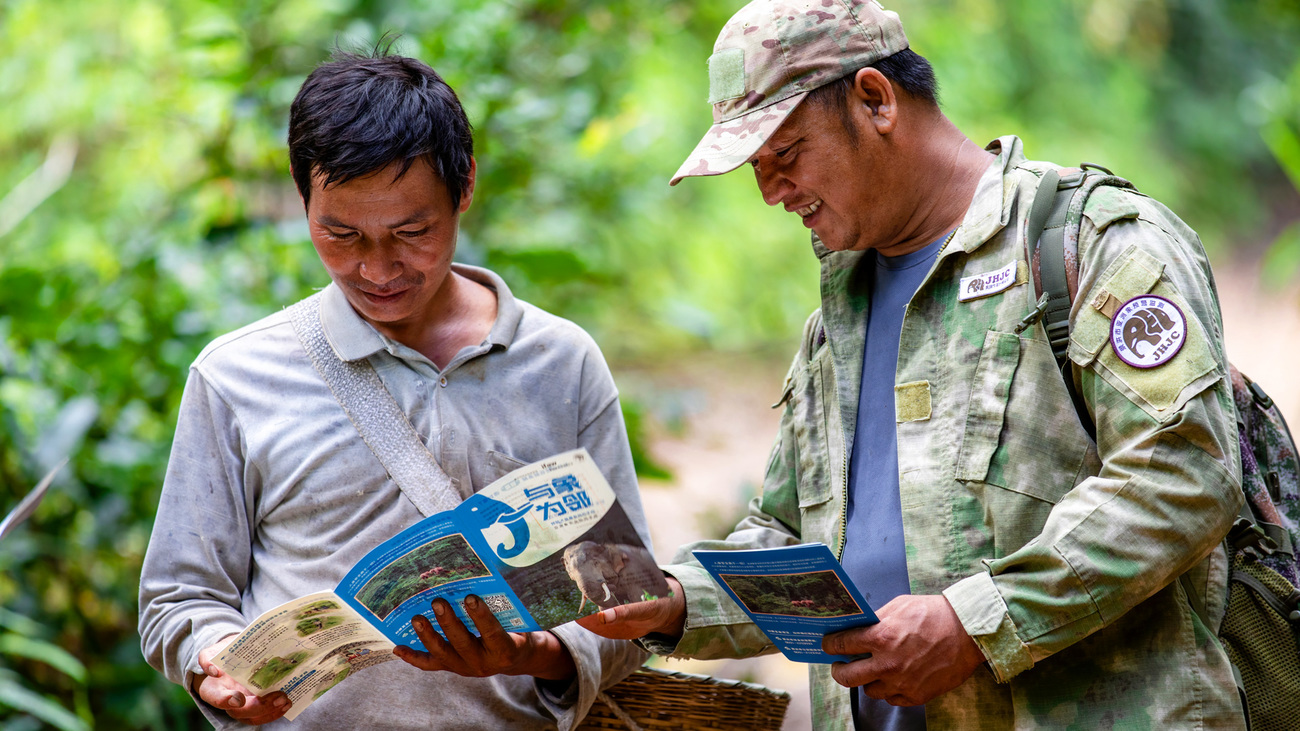
Improving livelihoods
One of the project's initiatives is to support people to develop courtyard economies. By providing small loans and agricultural training, the project helps the community transition to alternative livelihoods, improving farmers' incomes.
Zenghua Wang is one of the participants. In the 1990s, he planted around 32 acres of pineapples and sweet bamboo in the mountains. But when elephant herds appeared in the mountains, Zenghua's hopeful dreams of a better life became a feast for the wild elephants.
To protect his crops, Zenghua borrowed money and dug a large ditch, about two meters wide and deep, enclosing the area. But the rainy season washed away the soft soil, and the elephants entered the fields to feast. Overnight, Zenghua suffered heavy losses.
Initially, Zenghua believed that IFAW’s project would be like other conservation organisations’ projects—providing temporary assistance and then leaving the villagers to face problems alone. That kind of help was not sustainable, so, during the early evaluation stage, he withdrew.
However, a year later he discovered that IFAW was still actively assisting the villagers. They taught the villagers project management, invited agricultural and forestry experts to provide training, and guided the villagers in adopting more scientific approaches to planting crops to avoid attracting elephants. Zenghua decided to rejoin the project.
From 2000 to 2005, the project provided small loans to over 210 households in seven villages of Pu'er City, helping them switch to crops that were not only economically valuable but also contributed to reducing carbon emissions, while being less favoured by elephants.
Remarkably, the average annual income of each household increased by an impressive 35%, with a 100% repayment rate.
Beekeeping for a bigger cause
In 2020, IFAW also began a beekeeping pilot programme in Daotangqing village, next to the conservation area. Daotangqing is small, with only 34 households, and the villagers mainly cultivate rubber, nuts, mangoes, and other crops.
Compared to surrounding villages, Daotangqing has relatively few forests and farmland. The presence of Asian elephants limits the villagers' opportunities to develop other livelihoods.
In June 2020, IFAW, Xishuangbanna National Nature Reserve, and Xishuangbanna Tropical Rainforest Conservation Foundation jointly launched the beekeeping project. The first batch of 100 beehives was distributed among ten households. The aim was to find a sustainable alternative income that could withstand market fluctuations while safeguarding elephants and the natural environment. Bees also pollinate plants within the protected area and help conserve the biodiversity of the Asian elephant's core habitat.
Cao explained that, compared to other agricultural endeavours, beekeeping requires lower labour input. Each family needs to maintain only a limited number of beehives, and beekeepers spend around six hours every ten days to tend to the hives. Cao led the villagers in learning the skills of beekeeping, eco-friendly fruit tree cultivation, hive maintenance, and honey collection.
One of the project participants is Baolin Luo, who is in his seventies. As Luo chats with Cao, he acknowledges that his body could no longer endure the physical labour of traditional farming. The oldest beekeeper among the project participants, he also has the most rewarded hives. He happily presents the awards he has won in activities IFAW organises. In 2022, he harvested 100 kilograms of honey, bringing him joy and pride.
In April 2023, IFAW worked with e-commerce platform Hema to launch a limited edition of the first zero-carbon Elephant-Friendly Honey The 3,000 bottles are exclusively sold in Freshippo’s online and offline stores in China.
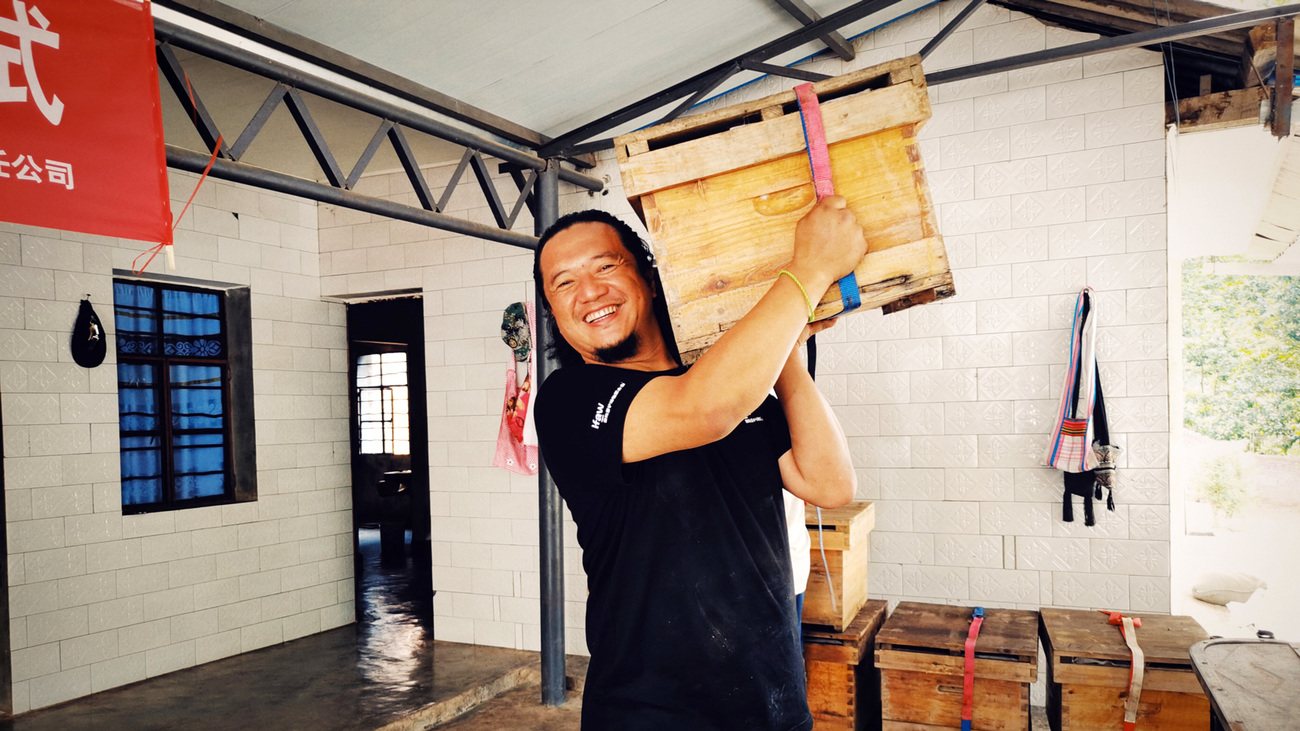
From beekeepers to ecosystem protectors
As the project delved deeper, participants grew increasingly aware of the significance of the surrounding forest and elephants for the ecosystem. They even got rid of over 38 acres of rubber forests to make way for ecologically friendly orchards. The project also reduced pesticides and fertilisers, lowered labour costs, and enhanced ground cover vegetation.
Beekeeping has reduced how often villagers enter the forest, and many of them have become voluntary advocates for elephant conservation.
Shaokuan Wang, 23, reminisces about working in a rubber plantation, where he often worked through the night and battled unfavourable weather conditions, including unexpected heavy rainfalls. Wang also faced market saturation, adding further challenges to earning money.
‘Young people need to do something meaningful, to explore new things,’ he says about his decision to join the beekeeping project. ‘All these experiences will become beautiful stories that I can share with my future children.’
He sold the honey he collected through online platforms and created videos showcasing the village’s beauty, the story behind the beekeeping project, and the importance of elephant conservation. He’s so glad that this not only increased honey sales but also allowed more people to learn about the village and the beekeeping project.
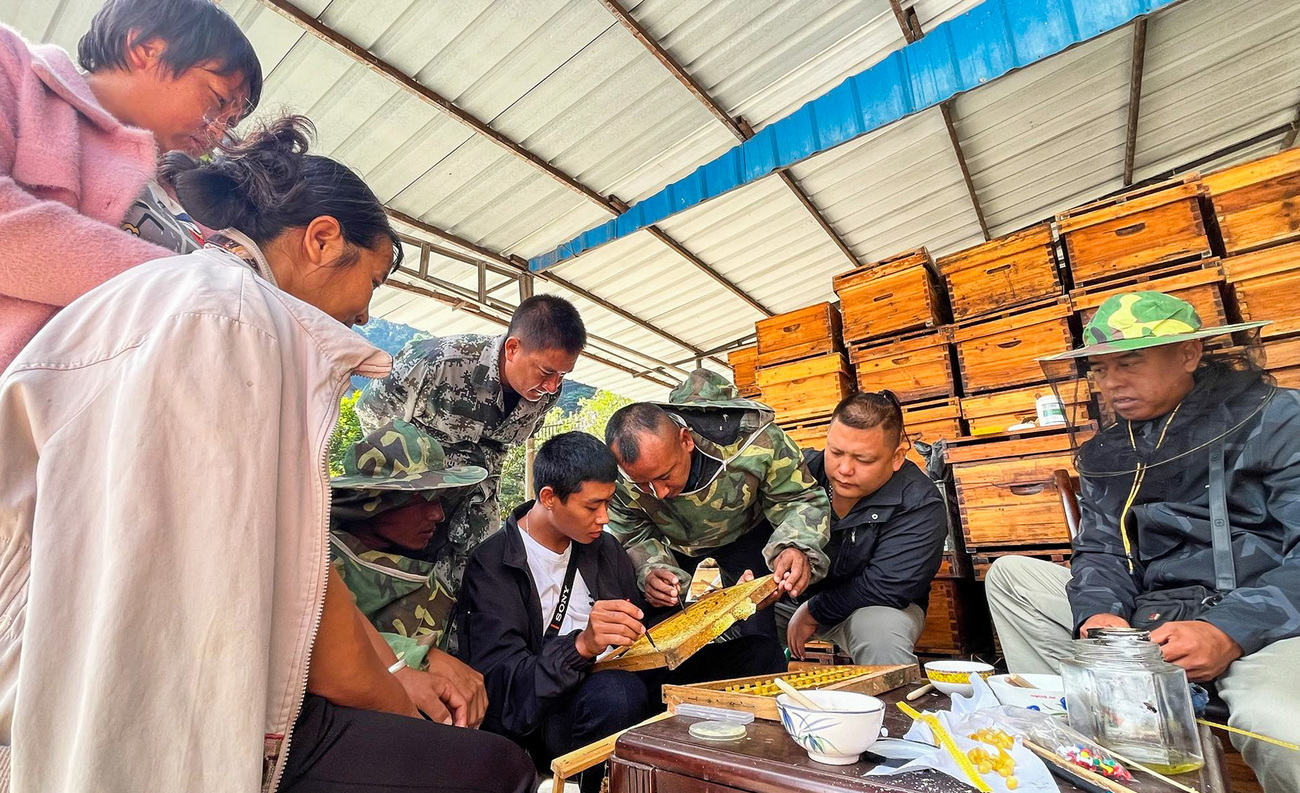
Women lead the way
Many of the women who participated were initially reluctant and inexperienced in taking a leading role or speaking up. However, they went on to lead their groups and achieved remarkable increases in income.
When Jiangmei Zhang, 39, first heard about beekeeping, she quickly shook her head and refused, fearing the stings of the bees. However, now she manages all aspects of beekeeping on her own, and her success has inspired other women to join.
‘People always have an impression of bees as hardworking and busy, but after joining the beekeeping project, my life has in turn slowed down,’ she says. ‘The income from beekeeping allows me to spend time with my family.’
As their livelihoods gradually improve, the villagers have developed a new understanding of the relationship between humans and nature. They now proactively maintain sanitation in the village. Plastic waste is no longer scattered everywhere, and there is less wastewater from livestock farming.
‘We share the same environment with bees and elephants, and only if the environment around the village is well maintained will the honey we produce be more hygienic and safe to sell at a good price!’ Zhang says.
Elephant safety beyond livelihoods
The project also launched China's first village-level early warning system in Pu'er City, covering more than 40 communities in four townships. Between 2009 and 2014, not a single human-elephant conflict occurred in these areas.
In 2016, the Asian Elephant Early Warning and Monitoring Center in Menghai County, Xishuangbanna, equipped 20 patrol officers with monitoring devices to improve their monitoring capabilities. The system now covers over 50 key villages where Asian elephants are present, benefiting over 50,000 local residents. According to local government data, as of May 2019, the monitoring system had successfully prevented 57 cases of human-elephant conflict.
In 2021, the Community Ranger Network Initiative was launched, aiming to improve the safety of both humans and elephants in the region. IFAW provided comprehensive training to 30 rangers, who lead safety training for villagers. In two year time, the initiative provided training to 94% of the 191 communities in Jinghong with elephant movement. Over 330 trainings were provided to over 11,000 community members. IFAW also supports regular patrols and conducts community education programmes on how to prevent human-elephant conflict.
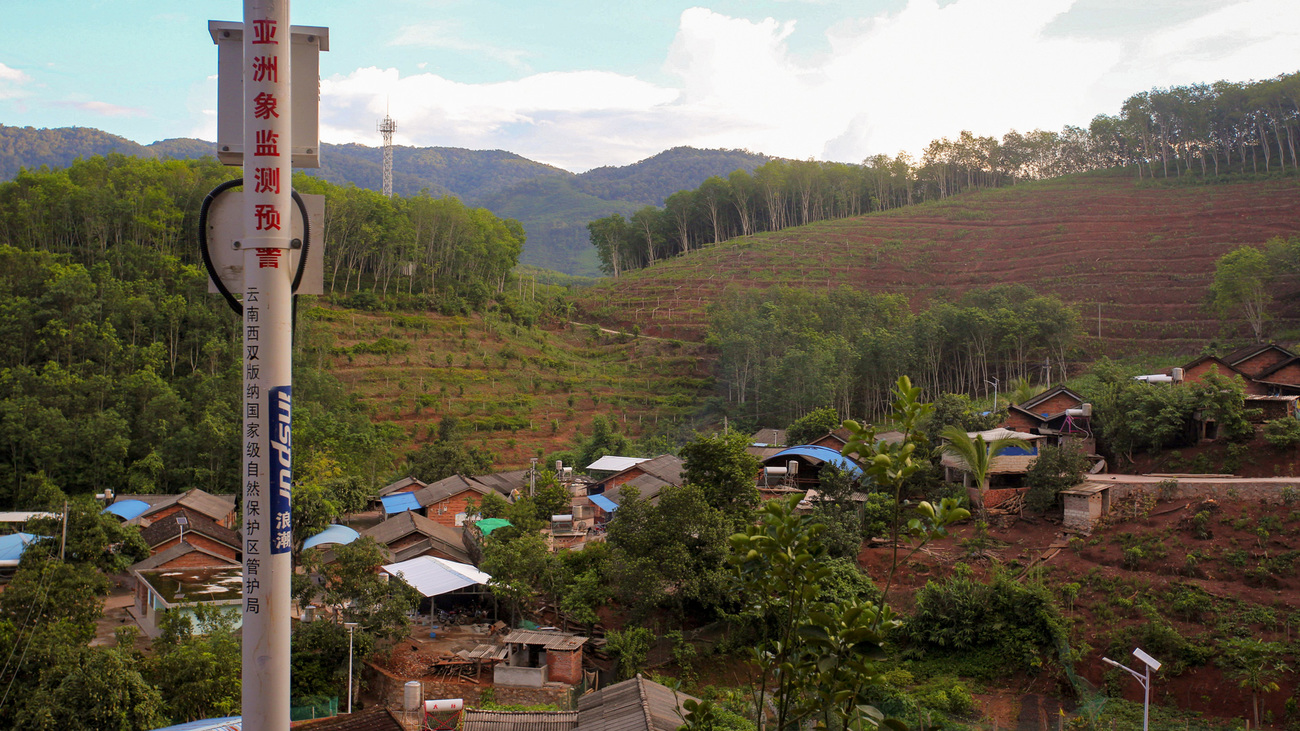
Educating younger generations
IFAW has also collaborated with Xishuangbanna education authorities and local schools to develop the textbook Knowing Elephants, along with a series of courses on Asian elephant protection, reaching over 30,000 students from at least 60 local schools. And more than 500 staff and tour guides from scenic spots have received training on how to promote Asian elephant conservation to visitors in Yunnan.
Through these interactions and initiatives, many local communities in Yunnan have regained a sense of pride in protecting Asian elephants.
The journey continues
Cao remembers what a community ranger told him after encountering a group of Asian elephants feeding in the distance: ‘They were eating on that side of the mountain, and I was having lunch here. I felt truly content. Isn't this the harmony between us and the elephants?’
Related content
every problem has a solution, every solution needs support.
The problems we face are urgent, complicated, and resistant to change. Real solutions demand creativity, hard work, and involvement from people like you.